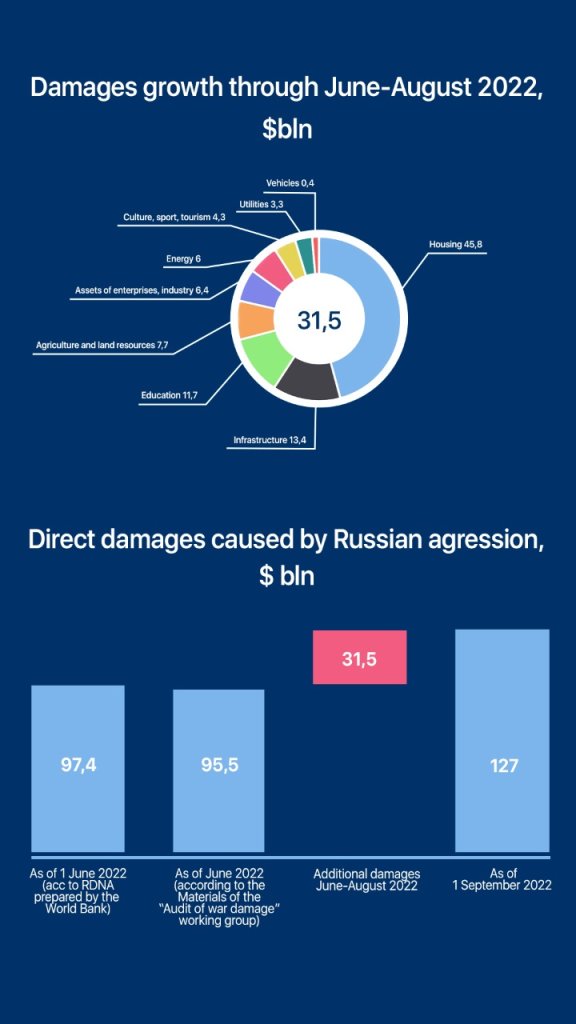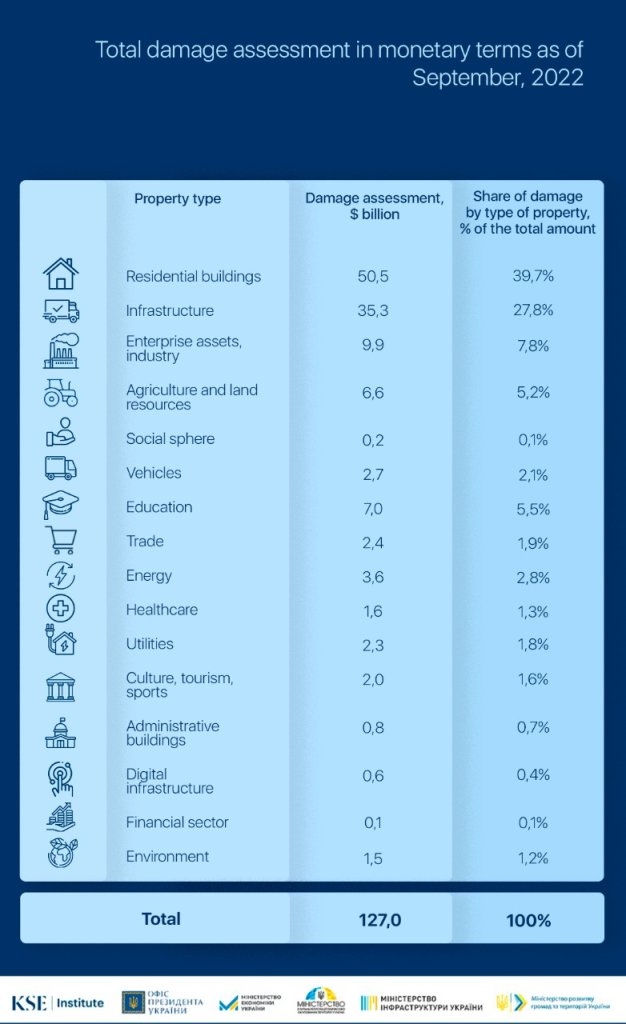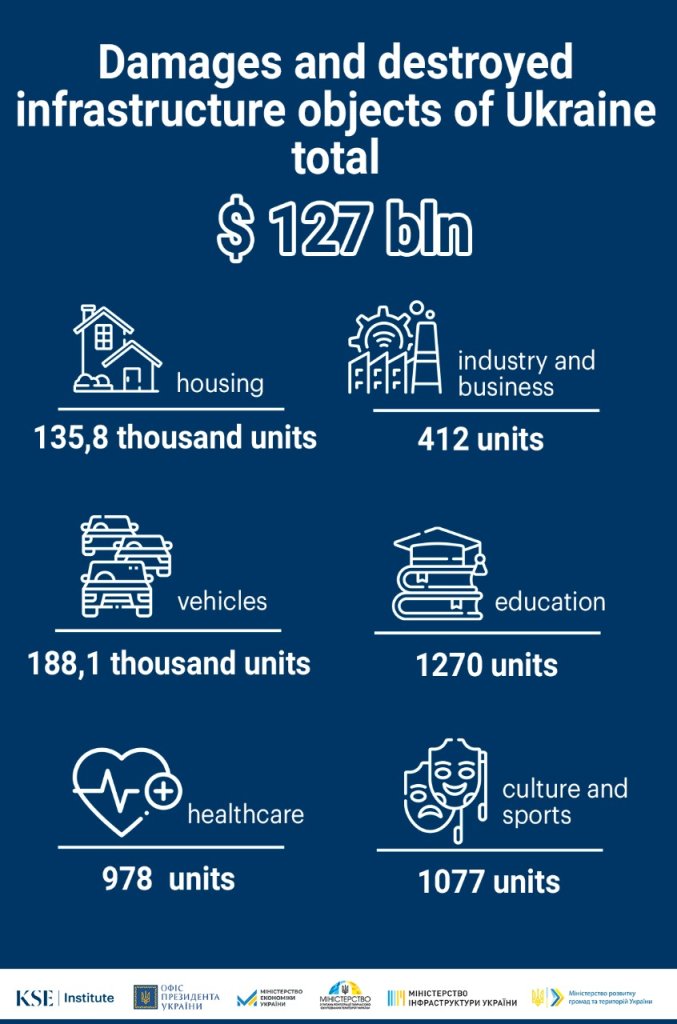- Kyiv School of Economics
- About the School
- News
- The total amount of damage caused to Ukraine’s infrastructure is more than $127 billion — KSE Institute’s report as of September 2022
The total amount of damage caused to Ukraine’s infrastructure is more than $127 billion — KSE Institute’s report as of September 2022
21 October 2022
As of September, 2022, the total amount of documented damage to residential and non-residential real estate, other infrastructure amounted to more than $127 billion (at replacement cost).
This assessment is due to the report presenting the results of the damage infrastructure assessment of Ukraine, incurred as a result of Russia’s military aggression. The report covers the period from February 24 to September 2022 and is available via the link.
The damage assessment was carried out within the framework of the National Council for the Recovery of Ukraine from the Consequences of the War by the analytical team of the Kyiv School of Economics (KSE) together with the Ministry of Community Development and Territories, the Ministry of Infrastructure, the Ministry of Health, under the coordination of the Ministry of Reintegration Temporarily Occupied Territories and in cooperation with other relevant ministries and the National Bank.
According to the report, in June-August 2022, Ukraine additionally suffered $31.5 billion in damages to its assets.

The largest share in the total volume of damages belongs to residential buildings — 39.7% or $50.5 billion. Compared to the beginning of June 2022, this amount increased by $11.2 billion. According to latest data, as of September 2022, the total number of destroyed or damaged housing stock is about 135.8 thousand buildings, among them 119.9 thousand are private (individual) houses; 15.6 thousand — multi-apartment buildings; 0.2 thousand — dormitories. Compared to the beginning of June 2022, the number of damaged and destroyed residential buildings increased by 15,000. The total area of damaged or destroyed objects is 74.1 million square meters, which is 7.3% of the total area of Ukraine’s housing stock.
In second place in terms of the amount of damages is the sphere of infrastructure — 27.7% or $35.3 billion, of which $26.6 billion — due to the direct destruction of roads and $4.3 billion — the total damages of the railroad. For June-August 2022, the damage caused to the railway infrastructure increased by $1.7 billion.
Business asset damages are at least $9.9 billion and continue growing. This is the third-largest share of infrastructure damage. In terms of industries, metallurgy suffered the most. In total, at least 412 enterprises have been damaged or destroyed since the beginning of the war, of which 64 are large and medium-sized enterprises. Expecting, the actual figure may be higher, as there is currently no complete information on the state of Ukrainian enterprises located in the temporarily occupied territories.
Experts estimate the damages caused to the educational infrastructure of Ukraine at $6.95 billion. Compared to the beginning of June, the damages to educational institutions amounted to $2.2 billion. This amount increased both due to the growth in the number of damaged and destroyed objects and due to the expansion of the educational infrastructure objects list, the damages of which are assessed within the framework of the project. In total, as a result of hostilities, at least 810 were destroyed and 1865 objects of educational infrastructure and 1693 were damaged. The largest number of destroyed educational institutions was recorded in Donetsk, Kharkiv, Luhansk and Kyiv regions.

Compared to the beginning of June 2022, there was a significant increase in the number of destroyed and damaged infrastructure objects: from 121,000 to 136,000 objects, the number of residential objects affected by the war increased from 777 to 978 – medical facilities, from 111 to 616 — administrative buildings, from 105.2 thousand to 188.1 thousand — private cars.
Since the beginning of Russia’s war against Ukraine, at least 616 administrative facilities, 978 healthcare facilities, of which 24 are private health care institutions, 1270 schools, 786 kindergartens, 775 cultural facilities, 80 religious buildings, 149 tourism facilities, and 153 sports facilities, 2,910 retail outlets, 19 airports and civilian airfields, 110 railway stations, 315 of bridges and bridge crossings, 10 thermal power plants, 322 boiler houses have been damaged, destroyed or seized.

The overall damage assessment was carried out in accordance with the methodology of the World Bank, and in close cooperation with the specialized team of the World Bank, considering the significant amount of micro-data collected by the specialized authorities, and local civil-military administrations since the beginning of the full-scale war.
The report presents detailed calculations for each of the sectors: social sector, infrastructure, ecology, productive sector, and demining, as well as a list and assessment of the most affected industrial assets and regional breakdown by the number of destroyed objects.
The report of the “Russia will pay” project presents the results of the damaged infrastructure assessment of Ukraine, incurred as a result of Russia’s military aggression, available via the link.
The updated assessment of the losses to the economy and the recovery needs for the infrastructure sectors will be presented in the next press release of the “Russia will pay” project in October 2022.
The project team also includes volunteers from the Center for Economic Strategy, Dragon Capital, the Anti-Corruption Headquarters, Institute of Analysis and Advocacy, Transparency International Ukraine, Prozorro.Sale, Prozorro, Ukrainian Council of Shopping Centers, CoST Ukraine, Vkursi Agro, TVIS Ukraine, Retail Association of Ukraine, Culver Aviation, Center for Innovations Development.
This assessment is fully funded by UK aid from the UK government. The work also became possible due to the support of the American People through the United States Agency for International Development (USAID). The estimate and its result do not necessarily reflect the views of the UK government’s official policies, the United States Government, and the United States Agency for International Development.
